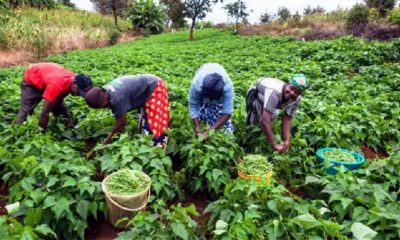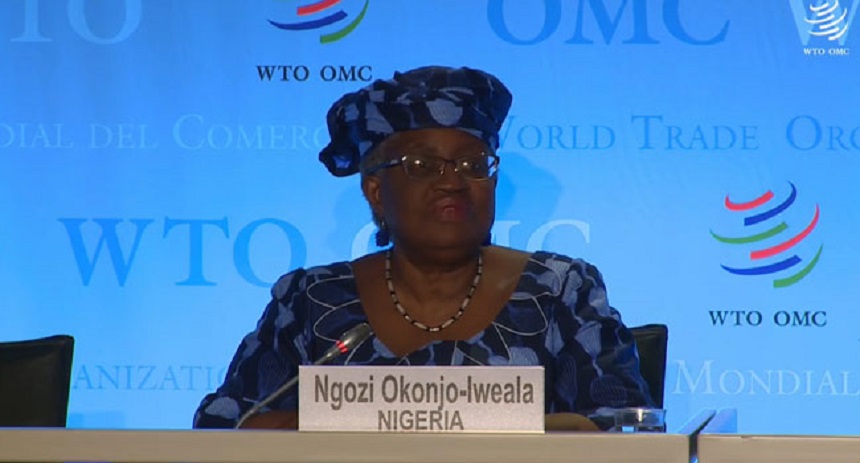Economy
natnuPreneur Farmers Enjoy 37.5% Profit Yearly on Investment—Adewole

By Modupe Gbadeyanka
Coordinator of natnudO Foods’ broiler out-grower scheme tagged ‘natnuPreneur,’ Mr Gbolade Adewole, has disclosed that farmers registered under the six- seven week broiler production scheme have consistently enjoyed between 7.5% and 15% profit on investment per cycle.
He noted that with a potential to conclude 5 cycles per year, efficient farmers stand to make between 37.5% and 75% profit per annum, making natnuPreneur “broiler out-grower” the most profitable poultry scheme in the country.
Mr Adewole made the revelation while addressing journalists at a press briefing on Tuesday, August 15, 2017 in Lagos.
He also disclosed that between October 2014 and July 2017, poultry farmers registered under the three year ‘pilot phase’ have reared over 4 million birds and the firm has off-taken birds to the value of over N4 billion.
Mr Adewole stated that the natnuPreneur initiative is not only in the business of providing a ready market for broiler farmers, but also in ensuring that they are consistently in business and that they make profits that can be sustained consistently over time.
“We treat our farmers’ farms as our own and invest a lot of time in ensuring their poultry businesses are run with global best practices as we run and manage ours, because we believe that our success is closely tied to the success of our farmers.
“Our vision is to create passionate, knowledgeable, and wealthy poultry farmers nationwide through sustained profitability.
“It is not enough to help farmers achieve profitability after just one cycle. We have heard of many out-grower schemes in the past where farmers make millions but couldn’t retain it afterwards. What we are most concerned about is that the profit our farmers make increases and is sustained. In other words, we make and retain broiler millionaires through frequent training on poultry management processes and continuous monitoring/supervision of farm activities,” he said.
He further emphasized, “We help our farmers understand the dynamics of poultry business through effective and regular training, monitoring and mentorship.
“We also help them increase efficiency of production by taking them through good management practices on how to manage their resources, using our Net profit calculator to understand the details of the economics of broiler production, and how to reduce mortality of birds.”
He further said that in their three years of operation, they have been able to increase the capacity of their farmers in terms of number of birds stocked, thereby making them grow profitably.
“natnuPreneur has a standard operating manual used in monitoring optimal farm management, such that, lapses in standard processes are quickly noticed and brought to the attention of the farmer.
“Aside from this, we pay weekly visits to farms to monitor their progress and offer business and technical advice when needed. These activities have helped to achieve the success level recorded by our farmers so far,” he added.
According to him, “these processes are what distinguish natnuPreneur from other broiler out-grower schemes the country has witnessed in the past.”
In terms of societal impact, Mr Adewole pointed out that natnuPreneur has created thousands of direct and indirect employment across the country.
“natnuPreneur has directly employed 150 graduates, working as extension officers (Farmer Satisfaction Representatives, in the Feed mill, hatchery and abattoir) and there are plans to recruit 60 more to manage the increase in capacity.
“Presently, the initiative indirectly influences the employment of over 5,000 people, who work at various levels with farmers and farmer cooperatives.
“There is a potential to have additional 1 Million people, directly working with natnuPreneur in different capacities, within the entire value chain (Feed Mill, Hatchery, Logistics and transportation, Chicken processing, Chicken distribution/sub distribution and our Retailers, called natnuPreneur Seller,” he said.
He further revealed that the scheme, which has engaged several small and medium scale broiler poultry farmers, is intended to help boost supply of high quality locally bred chicken for consumption across the country, making quality chicken available as well as affordable to all Nigerians.
Mr Adewole revealed that the credibility of the scheme, has over the years, earned them partnership with many commercial banks like Sterling bank, Heritage bank and Jaiz bank, as well as many microfinance banks in the country, while adding that the scheme has also attracted the Anchor Borrower programme of the Central Bank of Nigeria (CBN) where we have partnered with Bank of Agriculture (BOA), Nigeria Incentive Based Risk Sharing System for Agricultural Lending (NIRSAL) and Bank of Industry (BOI).
“We have collaborated with these institutions and shared resources in the process. The learning, data gathered and analysed over this period has been used constantly to optimize our processes and improve our systems. This is then feedback into our systems and in house application developed specifically to monitor our performance,” he disclosed.
He concluded that the natnuPreneur scheme is set to reposition poultry out-grower service in Nigeria by supporting the establishment of new broiler farms and expanding existing ones in the nooks and crannies of the country.
While also addressing newsmen, Deacon Toromade Francis, General Manager, Policy and Strategy, Amo Group and Mr Oloruntoba Emmanuel, General Manager, Amo Byng, a member company of Amo Group called on governments at all levels to be more proactive in curbing the menace of smuggling chicken products into the country and also support the local production of maize and soya, adding that if this is done, the initiative will be able to create more employment opportunities, absorb over 10 million people and add significantly to the overall GDP of the nation.
Sharing their experiences, two long term natnuPreneur farmers, Dr Robinson of Kadapo farms in Kwara State and Mrs Tomori of Honey Dew farms, Oyo State, made highly complementary comments and confirmed the claim made by the AMO FARM’s team.
Economy
FG Targets Credit Access For 50% Workers By 2030

By Adedapo Adesanya
The Vice President, Mr Kashim Shettima, inaugurated the Board of the Nigerian Consumer Credit Corporation (CREDICORP) and gave a 50 per cent access target for workers, saying consumer credit was critical to Nigeria’s ambition of becoming a one-trillion-dollar economy by 2030.
According to him, President Bola Tinubu established the CREDICORP to build a trusted credit infrastructure, provide catalytic capital to lower borrowing costs, and help Nigerians overcome long-standing cultural resistance to credit.
Speaking on Thursday in Abuja when he inaugurated the board on behalf of the President, the Vice President, in a statement by his spokesman, Mr Stanley Nkwocha, said that the quality of life of Nigerians cannot improve without closing the gap between access to capital and human dignity.
“A civil servant who earns honestly does not have to chase sudden wealth just to buy a vehicle, or save for ten years to buy one. A young professional should not remain in darkness simply because solar power must be paid for all at once,” the Vice President said.
VP Shettima disclosed that in just one year of operations, CREDICORP has disbursed over ₦37 billion in consumer credit to more than 200,000 Nigerians, with over half of them accessing formal credit for the first time.
The Vice President said the organisation was specifically tasked with building credit infrastructure to bridge the trust gap between lenders and borrowers, providing wholesale capital and credit guarantees through its portfolio company.
“Ultimately, these critical jobs of CREDICORP will enable access to consumer credit to at least 50 per cent of working Nigerians by 2030,” he said.
The Vice President explained that the new board’s role was not ceremonial as they are custodians of the organisation’s mission, adding that the long-term strength of the institution would depend on their “vigilance, integrity, sacrifice, and commitment.”
He directed Board members to uphold Public Service Rules, the Board Charter, and all applicable governance frameworks, warning that accountability and stewardship of public resources were non-negotiable.
The Chairman of CREDICORP, Mr Aderemi Abdul, expressed appreciation to President Tinubu for his vision behind the formation of CREDICORP and for the confidence reposed in them, noting that the establishment of the corporation marked an important step towards strengthening the nation’s financial architecture.
He assured President Tinubu that the board understands its responsibility and will guide the institution to deliver meaningful benefits to Nigerians.
For his part, Mr Uzoma Nwagba, Managing Director/CEO of CREDICORP, recalled watching President Tinubu say 20 years ago that consumer credit is one of the major tools that will improve the lives of Nigerians.
He noted that over the past 18 months, the institution has benefited more than 200,000 Nigerians, including students.
He assured that the presidential vision behind CREDICORP would not be taken lightly, as the team considers their appointments a unique, once-in-a-lifetime opportunity.
Other members of the board inaugurated include Mrs Olanike Kolawole, Executive Director, Operations; Mrs Aisha Abdullahi, Executive Director, Credit and Portfolio Management; Mr Armstrong Ume-Takang (MD, MoFI), Representative of MoFI; Mrs Bisoye Coke-Odusote (DG, NIMC), Representative of NIMC; and Mr Mohammed Naziru Abbas, Representative of FMITI.
Others are Mr Marvin Nadah, Representative of FCCPC; Mrs Chinonyelum Ndidi, Representative of the Federal Ministry of Finance; Mr Mohammed Abbas Jega, Independent Director; and Mrs Toyin Adeniji, Independent Director.
Economy
NASD OTC Exchange Rallies 0.23% as Nipco Leads Six Advancers

By Adedapo Adesanya
Six price gainers helped the NASD Over-the-Counter (OTC) Securities Exchange retain its stay in green territory after a 0.23 per cent appreciation on Thursday, February 26.
The price gainers were led by Nipco Plc, which added N25.00 to close at N278.00 per share compared with the previous day’s N253.00 per share, NASD Plc rose by N5.13 to N56.41 per unit versus N51.28 per unit, FrieslandCampina Wamco Nigeria Plc expanded by N2.24 to N102.44 per share from N100.00 per share, Afriland Properties Plc grew by 88 Kobo to N18.88 per unit from N18.00 per unit, 11 Plc increased by 35 Kobo to N277.00 per share from N276.65 per share, and Lagos Building Investment Company (LBIC) Plc gained 27 Kobo to close at N3.75 per unit versus N3.48 per unit.
On the flip side, Central Securities Clearing System (CSCS) Plc lost N1.75 to sell at N68.25 per share versus N70.00 per share, and Geo-Fluids Plc depreciated by 2 Kobo to N3.25 per unit from N3.27 per unit.
The weight of the advancers fortified the NASD Unlisted Security Index (NSI) by 9.21 points to 4,034.46 points from 4,025.25 points, and the market capitalisation soared by N5.51 billion to N2.413 trillion from Wednesday’s N2.408 trillion.
Yesterday, the transaction value jumped by 18.8 per cent to N102.8 million from N80.7 million, and the number of deals surged by 18,8 per cent to 38 deals from 32 deals, while the transaction volume went down by 84.9 per cent to 1.3 million units from 8.7 million units.
At the close of business, CSCS Plc was the most traded stock by value (year-to-date) with 34.2 million units worth N2.04 billion, followed by Okitipupa Plc with 6.3 million units sold for N1.1 billion, and Geo-Fluids Plc with 122.1 million units valued at N478.2 million.
Resourcery Plc remained as the most traded stock by volume (year-to-date) with 1.05 billion units exchanged for N408.7 million, trailed by Geo-Fluids Plc with 122.1 million worth N478.2 million, and CSCS Plc with 34.2 million units traded for N2.04 billion.
Economy
Naira Down Again at NAFEX, Trades N1,359/$1

By Adedapo Adesanya
The Naira further weakened against the Dollar in the Nigerian Autonomous Foreign Exchange Market (NAFEX) for the fourth straight session this week on Thursday, February 26.
At the official market yesterday, the Nigerian Naira lost N3.71 or 0.27 per cent to trade at N1,359.82/$1 compared with the previous session’s N1,356.11/$1.
In the same vein, the local currency depreciated against the Pound Sterling in the same market window on Thursday by N8.27 to close at N1,843.23/£1 versus Wednesday’s closing price of N1,834.96/£1, and against the Euro, it crashed by N8.30 to quote at N1,606.89/€1, in contrast to the midweek’s closing price of N1,598.59/€1.
But at the GTBank forex desk, the exchange rate of the Naira to the Dollar remained unchanged at N1,367/$1, and also at the parallel market, it maintained stability at N1,365/$1.
The continuation of the decline of the Nigerian currency is attributed to a surge in foreign payments that have outpaced the available Dollars in the FX market.
In a move to address the ongoing shortfall at the official window, the Central Bank of Nigeria (CBN) intervened by selling $100 million to banks and dealers on Tuesday.
However, the FX support failed to reverse the trend, though analysts see no cause for alarm, given that the authority recently mopped up foreign currency to achieve balance and it is still within the expected trading range of N1,350 and N1,450/$1.
As for the cryptocurrency market, major tokens posted losses over the last 24 hours as traders continued to de-risk alongside equities following Nvidia’s earnings-driven pullback, with Ripple (XRP) down by 2.7 per cent to $1.40, and Dogecoin (DOGE) down by 1.6 per cent to $0.0098.
Further, Litecoin (LTC) declined by 1.3 per cent to $55.87, Ethereum (ETH) slipped by 0.9 per cent to $2,036.89, Bitcoin (BTC) tumbled by 0.7 per cent to $67,708.21, Cardano (ADA) slumped by 0.6 per cent to $0.2924, and Solana (SOL) depreciated by 0.4 per cent to $87.22, while Binance Coin (BNB) gained 0.4 per cent to sell for $629.95, with the US Dollar Tether (USDT) and the US Dollar Coin (USDC) closing flat at $1.00 each.
-

 Feature/OPED6 years ago
Feature/OPED6 years agoDavos was Different this year
-
Travel/Tourism10 years ago
Lagos Seals Western Lodge Hotel In Ikorodu
-

 Showbiz3 years ago
Showbiz3 years agoEstranged Lover Releases Videos of Empress Njamah Bathing
-

 Banking8 years ago
Banking8 years agoSort Codes of GTBank Branches in Nigeria
-

 Economy3 years ago
Economy3 years agoSubsidy Removal: CNG at N130 Per Litre Cheaper Than Petrol—IPMAN
-

 Banking3 years ago
Banking3 years agoSort Codes of UBA Branches in Nigeria
-

 Banking3 years ago
Banking3 years agoFirst Bank Announces Planned Downtime
-

 Sports3 years ago
Sports3 years agoHighest Paid Nigerian Footballer – How Much Do Nigerian Footballers Earn





















